Regional crises hound Arab League
Many say the pan-Arab policy has failed to live up to regional expectations.
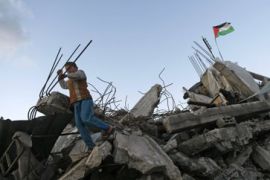
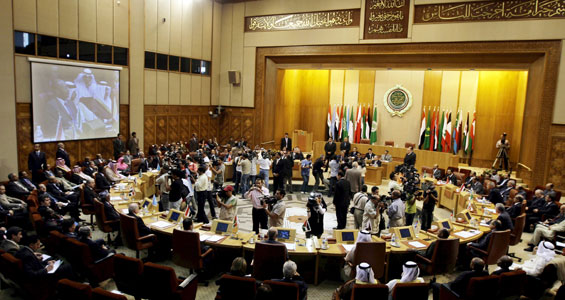 |
| The League is hoping to close ranks to deal with a number of crises in the Middle East [EPA] |
The League of Arab States, or Arab League, was established in 1945 to promote economic, political and social cohesion between emerging Middle Eastern states Iraq, Egypt, Syria, Lebanon, Jordan, Saudi Arabia and Yemen.
The founding members affirmed their commitment to “draw closer the relations between member States and co-ordinate collaboration between them, to safeguard their independence and sovereignty, and to consider in a general way the affairs and interests of the Arab countries.”
In its formative years, the 22-member Arab League became involved in supporting Arab independence movements against former colonial powers Great Britain and France.
Following the Arab defeat in the war which broke out shortly after Israel was established in 1948, the League shifted its focus to rejecting an Israeli presence in the Middle East and supporting Palestinian nationhood. In 1950, the Arab states signed a mutual defence treaty.
The Arab League has also served as a forum for mediating Arab disputes.
Though the League helped establish a little-used Arab Common Market in the 1960s and attempted to facilitate inter-Arab trade, infighting has kept plans of an economic bloc far from being realised.
Many in the Arab World say that the League’s effectiveness over the course of its 64-year history has slowly eroded as disputes between member states increase.
PLO created
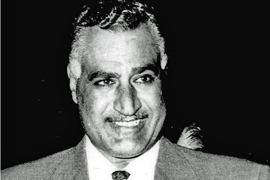 |
| Nasser’s goal was to unify Arab ranks to liberate Palestine from Israel [ARCHIVE] |
In June 1964, Gamal Abdel Nasser, the then-Egyptian president, convened the first summit of Arab heads of state in an attempt to establish a common policy position regarding Israeli occupation of Palestinian land.
The Palestine Liberation Organisation (PLO), led by Yasser Arafat, was formed and supported by member states during this summit.
However, the Arab defeat during the June 1967 Six Day War with Israel, shattered the myth of Arab military might.
At the fourth Arab League summit in Sudan in late August 1967, member states pledged to uphold the “Khartoum resolution”, emphasising they would not recognise or negotiate with Israel until it withdrew from territory it won during the war.
Despite a unified position in the wake of the 1967 defeat, the League’s effectiveness was hampered by divisions among member states. At the height of the Cold War, some Arabs appeared to have allied with the Soviet Union while others turned to the US and the West.
The divisions would be exacerbated in March 1979 after Egypt signed a peace treaty with Israel. The Sinai Peninsula was returned to Egypt in exchange for full diplomatic relations between the two former enemies.
The Arab League suspended Egypt’s membership, accusing Cairo of abandoning the Palestinian cause, and relocated its from Cairo to Tunis.
Mustafa al-Bakri, an editor of the Egyptian weekly political magazine Al-Osboa and a member of parliament, said: “The Arab League, since its beginning, has been weakened mainly by the 1979 Camp David peace treaty [between Egypt and Israel], which I think became the starting point of intra-Arab conflicts.”
Egypt was re-admitted into the League in 1989 and the headquarters moved back to Cairo.
Bakri says the 1990 Iraqi invasion of Kuwait also shattered the myth of Arab unity as some countries sided with Baghdad while others supported US-led efforts to force Saddam Hussein, the then-Iraqi president, to withdraw.
“The whole region went into a crisis that was reflected in the Arab League’s incapacity to act with the resolve needed to prevent the Gulf War. Most summits since then have lost meaning,” Bakri added.
Non-binding resolutions
| In depth |
|
|
The Arab League appears at first to follow the administrative structure of the United Nations.
It is headed by a secretariat, which is led by a secretary-general, who is nominated – and chosen in a vote – by member states. The secretary-general oversees the secretariat which acts as the executive body of specialised ministerial councils.
Each of the 22 member states has one vote and there is no veto mechanism.
The Arab League differs from the United Nations Security Council since it leaves resolutions to be independently adopted and enforced by member states.
Though most Arab League meetings and sessions conclude with a common communique or resolution on current affairs, there is no mechanism either to enforce these positions or to penalise Arab states that do not follow the organisation’s resolve.
In 2002, the League reaffirmed that no member state should pursue normalisation of ties with Israel until Tel Aviv withdrew to borders prior to the June 1967 war.
All 22 members of the league signed off on this resolution, but within weeks Mauritania initiated dialogue with Israel which led to the establishment of normal ties between the two countries.
Though Mauritania was condemned in some Arab media, its actions were not addressed in subsequent meetings, despite being at odds with Arab League resolutions.
Arab will lacking
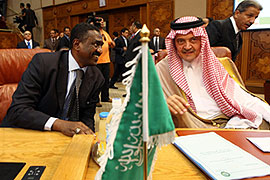 |
| Arabs say regional leaders must take action beyond convening summits [AFP] |
Ali Abd al-Moneim Said, director of the Al-Ahram Centre for Strategic and Political Studies, says the problem of enforcement may be due to a lack of common Arab will-power.
Said pointed to the League’s history of boycotts and walkouts; one-third of Arab leaders boycotted the Arab League summit in Algiers in 2005.
“How can the Arab League take a leading role in the absence of Arab leaderships themselves?” he asked.
“Most regional organisations are built upon the coalition of the willing. The Arab League will not reach this synergy because the charter of the League of Arab states doesn’t include a clause for enacting resolutions reached by member states. This has to be done through the Arab states themselves.”
Al-Osboa‘s Bakri agrees: “We are used to the Arab leaders making decisions which are not acted upon. The concluding statements contained mottos signifying nothing.”
Seeking reforms
In recent years, there has been growing momentum for the Arab League to reform its charter and its approach to handling regional conflicts.
At the 2004 Tunis summit, member states pledged to establish a mechanism that would reform the way league decisions are implemented.
The summit also promised the revitalisation of the Arab Common Market, creation of an Arab economic bloc, a security council, an Arab parliament and the establishment of an Arab Justice Court.
But the Tunis summit, which had initially been delayed by two months, ended without any concrete steps toward reform as infighting took its toll and Libya threatened to withdraw from the Arab League altogether.
The summit agreed on creating a follow-up committee tasked with supervising the implementation of proposals to reform the League. Discussion of the reforms was postponed to future Arab summits.
Hassan Abu Talib, editor-in-chief of the Arab Strategic Report (ASPSS), says Arab states are wary of reform because it would empower the Arab League with measures to sanction or censure members who defy a resolution.
“This kind of reform gives more power to the league, and lessens that of the state. The authoritative power of member states will gradually be minimised exactly as in the European Commission. This is not accepted in the Arab world,” Abu Talib told Al Jazeera.
“Reform of the Arab League depends mainly on how much commitment the Arab states are ready to give and how much power they will allocate the general secretariat of the Arab League. This kind of reform was disagreed on from the member states of the Arab league.”
Careful to avoid giving too much power to the secretariat, Algeria proposed a rotating seat for the secretary in late January 2005. The proposal was withdrawn after it threatened to divide the League into two camps.
No other substantial steps have been taken toward reform.
Regional crises
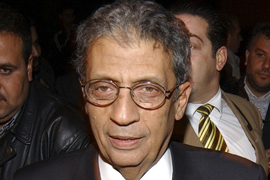 |
| Amr Moussa supports the Arab Peace initiative but has condemned Israeli actions in Gaza |
In the last decade, the League has faced a growing number of regional crises which have further divided ranks.
While the League was pre-occupied with the Israeli-Palestinian conflict in the 1945-1990 period, many more conflicts have been on the agenda in the past decade.
The US-led invasion of Iraq has proved to be the most enduring of challenges as the League worked to prevent the country from disintegrating into civil war and sectarian violence from spilling over into neighbouring states.
In recent years, the US criticised the League for not being more involved in post-invasion Iraq.
However, this appears to be changing: Amr Moussa, the secretary-general of the Arab League, has made two visits to Iraq in the past five years.
The League is also seeking to find solutions to the conflict between Hamas, the Islamist resistance movement in Gaza, and the Fatah-led PLO in Ramallah while trying to support initiatives that lead to renewed negotiations with Israel.
In recent years, members states have used the good offices of the League to mediate between Lebanon and Syria after the assassination of Rafiq al-Hariri, the Lebanese premier.
They have also sought to prevent a war between Iran and the US, which accuses Tehran of developing a weaponised nuclear programme.
Gamil Mattar, an analyst at the Arab Centre for Development and Futuristic Research, believes US pressure on the Arab League to support democratisation, safeguard human rights, and combat terrorism, will likely speed up a reform process to make the body more effective.
The US and the EU have also called on the Arab League to recognise Israel.
At the 2002 Beirut Summit, the League endorsed the Saudi-sponsored Arab Peace Initiative. Arab states would recognise Israel if it withdrew to borders prior to the 1967 war and allowed hundreds of thousands of Palestinian refugees to return to their homes.
But Israel rejected the offer.
The Initiative was again endorsed at the 2007 Riyadh Summit which agreed to send a mission of Jordanian and Egyptian foreign ministers to Israel to promote the initiative.
In 2008, the Arab League reiterated its support for the Arab Peace Initiative. Barack Obama, the US president, has said the Saudi-sponsored plan was an interesting proposal.
While not rejecting the plan, Ehud Olmert, the outgoing Israeli prime minister, has not accepted it as a framework for future peace negotiations.
Financial crisis
Further plaguing the Arab League is a financial crisis prompted by the failure of member states to pay annual contributions – a system similar to the UN’s membership dues.
According to an Arab League report in 2004, member states were $100 million in arrears, leaving many staff members going months without pay and causing the cancellation of some 200 projects throughout the Arab world.
“The financial crisis is part of the dysfunction which renders the Arab League incapable of doing its job. The Arab leaders didn’t respond to pay some of their dues until Moussa threatened to resign,” Bakri said.
Al-Ahram Centre’s Said believes the League’s budgetary crisis will likely impede efforts toward the organisation’s reform and expansion.
“We should first know our limits then plan our actions,” he said.
Optimism for reform
Salah Montassir, a leading journalist at Al-Ahram, Egypt’s official daily newspaper, says the League has managed to make considerable achievements despite the criticism it receives.
He points to numerous policy decisions which have helped shape school curricula, advance the role of women in Arab societies and promote child welfare.
He says the League has been particularly successful in boosting cultural, social, and educational ties between member states.
Ahmad Yusuf Ahmad, director of research at the Arab Studies Institute and a political science professor at Cairo University, says it is unfair to call the Arab League an inefficient organisation.
“In the presence of the Arab League, the Palestine Liberation Organisation was established and the Iraqi-Kuwaiti border crisis in 1960-61 was resolved peacefully. A new set of organisations were integrated in the social and cultural fields. When it had a chance, achievements were recognised,” he told Al Jazeera.
Challenges
However, the Arab League may be running out of time in convincing the so-called Arab street that it has a role to play.
The League has been criticised for failing to convince the US of pushing through a UN Security Council resolution that would have halted Israel’s war on Lebanon in July 2006.
The League has also been accused of failing to adopt a unified position on the international tribunal investigating the 2005 assassination of Rafiq al-Hariri, the Lebanese leader.
The League was also unable to bridge differences between Hamas, the Islamist resistance movement in Gaza, and the Palestinian Authority based in Ramallah, following the former’s win in Palestinian legislative elections in 2006.
Since then, the socio-political rift between the two Palestinian factions has further widened and in 2007 armed clashes killed many from both sides.
One of the most pressing issues facing the League is the International Criminal Court’s charges of war crimes against Omar al-Bashir, the president of Sudan, for his alleged role in the conflict in Darfur.
At a July 2008 meeting of ministers, the Arab League condemned the ICC charges, with some saying the court’s position could lead to a civil war in Sudan.
The March 30, 2009 summit in Doha is expected to pass a resolution in response to an ICC arrest warrant for al-Bashir issued earlier that month.
Failures
Many in the Middle East, however, believe the recent Israeli war on Gaza to have highlighted the Arab League’s incapacity to perform as an effective body acting in the best interests of the peoples of the region.
Following punitive embargoes and border closures preventing medicine and food from entering Gaza, Israel launched a 22-day offensive it said was to minimise the launching of homemade Palestinian rockets.
The offensive killed more than 1400, 900 of them civilians.
Sulaiman Ahmad, a government employee in Cairo, says he has no clear understanding of why the Arab League exists.
“It never achieved anything that makes us say ‘yes’ we support the Arab League in this or that. Actually, I don’t follow sessions or resolutions,” he said.
Inas Awad, a school teacher said the league’s failure to prevent the invasion and occupation of Iraq and the attacks on Gaza made her doubt the organisation’s influence on current Arab issues.
“I used to think it was like a UN of the Arab world. Now I doubt it,” she said.

 Sadat’s peace gambit
Sadat’s peace gambit